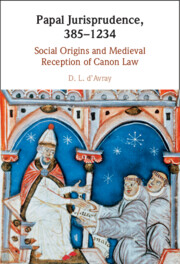Book contents
- Papal Jurisprudence, 385–1234
- Papal Jurisprudence, 385–1234
- Copyright page
- Dedication
- Contents
- Acknowledgements
- Abbreviations
- Sigla
- Introduction
- 1 Transformations and Long-Term Explanations
- 2 The Christian Roman Empire, c. 400
- 3 c. 400: Practical Complexities and Uncertainties
- 4 c. 400: Uncertainty about Grace
- 5 Papal Rulings and Ritual
- 6 Hierarchies
- 7 Clerical Status and Monks
- 8 Returning Heretics
- 9 Pelagianism and the Papacy
- 10 Leo I
- 11 Post-Imperial Syntheses
- 12 Early Papal Laws in the Barbarian West
- 13 Carolingian Culture and Its Legacy
- 14 1050–1150
- 15 Theology and Law
- 16 c. 400 and c. 1200: Complexity, Conversion, and Bigamia
- 17 Clerics in Minor Orders
- 18 Choosing Bishops
- Overall Conclusions
- Book part
- Select Bibliography
- Index
4 - c. 400: Uncertainty about Grace
Published online by Cambridge University Press: 10 March 2022
- Papal Jurisprudence, 385–1234
- Papal Jurisprudence, 385–1234
- Copyright page
- Dedication
- Contents
- Acknowledgements
- Abbreviations
- Sigla
- Introduction
- 1 Transformations and Long-Term Explanations
- 2 The Christian Roman Empire, c. 400
- 3 c. 400: Practical Complexities and Uncertainties
- 4 c. 400: Uncertainty about Grace
- 5 Papal Rulings and Ritual
- 6 Hierarchies
- 7 Clerical Status and Monks
- 8 Returning Heretics
- 9 Pelagianism and the Papacy
- 10 Leo I
- 11 Post-Imperial Syntheses
- 12 Early Papal Laws in the Barbarian West
- 13 Carolingian Culture and Its Legacy
- 14 1050–1150
- 15 Theology and Law
- 16 c. 400 and c. 1200: Complexity, Conversion, and Bigamia
- 17 Clerics in Minor Orders
- 18 Choosing Bishops
- Overall Conclusions
- Book part
- Select Bibliography
- Index
Summary
Influence of the dualist ‘Encratite’ tradition helps account for the pessimistic colouring of Augustine’s view of human nature, but this is far from being the whole story, in which a turning point was his attempt to explain what it could mean to say that God hated Esau. The sacred books which both Augustine and Pelagius accepted without question could bear either of their probably honest interpretations of grace. Even modern scholars can react strongly in opposite directions to this fifth-century controversy, on a spectrum from barely concealed dislike of Augustine’s idea of grace to apparently heartfelt eloquence in presenting it. While twenty-first-century society is comfortable with pluralism, at least on these topics, fifth-century Christianity was not. Contradictory certainties must have generated both uncertainty and unease among those not committed to either side.
Keywords
- Type
- Chapter
- Information
- Papal Jurisprudence, 385–1234Social Origins and Medieval Reception of Canon Law, pp. 47 - 55Publisher: Cambridge University PressPrint publication year: 2022

